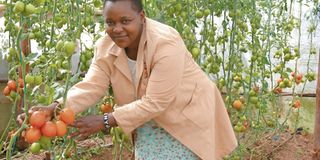Farmer earns tidy sum from tomatoes

Margaret Nyambura Njuguna inspects her mature tomato fruits inside her six-by-eight-metre greenhouse at Turi Farm in Elburgon. She started her greenhouse project with Sh40,000 for the cost of seeds, manure and labour. PHOTO | JOHN NJOROGE | MATION MEDIA GROUP
What you need to know:
- Nyambura started her greenhouse project in 2008 with Sh40,000 for the cost of seeds, manure and labour.
- She recalled how, in 2018, production declined drastically when she failed to spray her tomatoes at the right time.
- For the three years she has been growing tomatoes, Nyambura said the highest amount of money she has earned from the crop is Sh70,000 per month.
- Molo Sub-County Agricultural Officer Alfred Waithaka urged farmers to follow instructions while spraying their crops.
Clad in a light-brown dust coat, black open shoes, a white blouse and a dotted dress, Margaret Nyambura Njuguna inspects her mature tomato fruits inside her six-by-eight-metre greenhouse at Turi Farm, two kilometres from Elburgon town in Nakuru County.
Nyambura started her greenhouse project in 2018 with Sh40,000 for the cost of seeds, manure and labour.
“I used 450 seedlings that were certified by the Kenya Plant Health Inspectorate Service (Kephis) at a cost of Sh3,000,” said Nyambura, adding that she spaced her seedlings at 45cm by 60cm for the Anna F-1 seeds she planted.
Speaking to the Seeds of Gold team recently, Nyambura said she planted the crop at intervals of one metre in order to allow the tomatoes enough space to grow.
The farmer revealed that growing tomatoes inside a greenhouse is more economical and protects the crop from direct sunlight and heavy rainfall.
“Using water drips increases the yield because the crop gets optimal amount of water and temperature,’’ she said, adding that very little amount of rainfall and sunlight is needed.
Nyambura, who is also the director of Millennium Agro-Vet Stores in Elburgon, said she usually sprays her tomatoes to get rid of whiteflies, which damage the leaves.
She recalled how, in 2018, production declined drastically when she failed to spray her tomatoes at the right time.
“In that year, which was my first attempt to grow tomatoes through a greenhouse, I incurred a loss of more than Sh20,000 after I failed to spray on time,” Nyambura said.
She added that whiteflies mostly strike during the cold season and a farmer needs to spray the crop every month.
Nyambura said the outbreak of the Covid-19 pandemic has not affected her much because she normally sells her produce in the local market.
“I have actually increased my sales since the deadly virus was reported in the country. Some traders who used to travel to other places to get tomatoes have now decided to buy them locally,” she said.
BENEFITS FROM THE PROJECT
Nyambura added that other farmers who used to take their crop elsewhere have also decided to sell them at local markets.
She said on a good day, a crate of tomatoes retails at Sh3,000.
However, when the market is saturated, a crate of tomatoes goes for Sh1,500.
The farmer, who harvests twice per week, said she currently pockets between Sh5,000 and Sh6,000 per week from the venture.
For the three years she has been growing tomatoes, Nyambura said the highest amount of money she has earned from the crop is Sh70,000 per month.
“That was when the demand was high, as few farmers planted the crop. I harvested twice per week, with each crate selling at Sh5,000,” she said.
The farmer said she has benefited a lot from the project despite the small amount of space. She plans to extend her tomato farming and plant them in two acres of land.
Molo Sub-County Agricultural Officer Alfred Waithaka urged farmers to follow instructions while spraying their crops.
Waithaka said the insect Tuta absoluta, also known as the tomato leafminer, affects the leaves and stems and needs to be sprayed several times with Coragen insecticide, which kills it.
He also noted that by burning sulphur, the insects die when smoke billows inside the greenhouse.
Waithaka added that the tomato plants die and the yield decreases when not sprayed correctly.
He noted that late blight disease can also quickly ruin the entire crop and infect other plants as well.
“It is very destructive and farmers are urged to spray their crop twice a month,” said Waithaka, adding that farmers should also be on the lookout for the mosaic virus that affects the tomato fruit.
He advised farmers to practise crop rotation and draw a rotational calendar, adding that plants of the same family should not be planted in consecutive seasons.
“Planting plants of the same family, for example, capsicum and potatoes, may lead to the same infections that affected the previous crop affecting the new crop,’’ said Waithaka.
During an interview with Seeds of Gold, Waithaka said the maturity period for various tomato varieties range between three and three-and-a-half months, adding they can be harvested for up to one year if well-tended.





